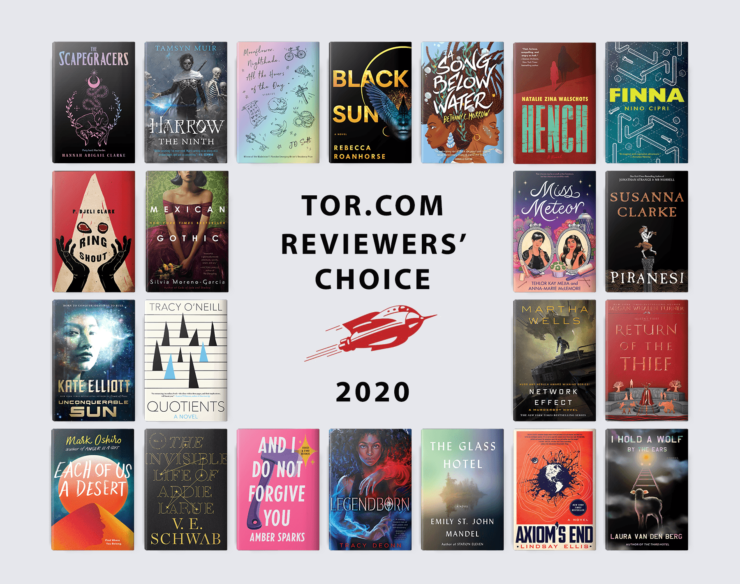It’s been a long and strange year, but one comforting thing that kept us going were the consistently amazing book releases in the genres of science fiction, fantasy, young adult, and beyond. Our reviewers each picked their top contenders for the best books of the year—and they almost all chose different titles! This year’s highlights run the gamut from action-packed science fiction and genre-bending epic fantasy, to neo-gothic horror and powerful anthologies. We’ve got ghosts, we’ve got empresses, we’ve got revolutionaries and superheros and wormholes in retail stores!
Below, Tor.com’s regular book reviewers talk about notable titles they read in 2020—leave your own additions in the comments!
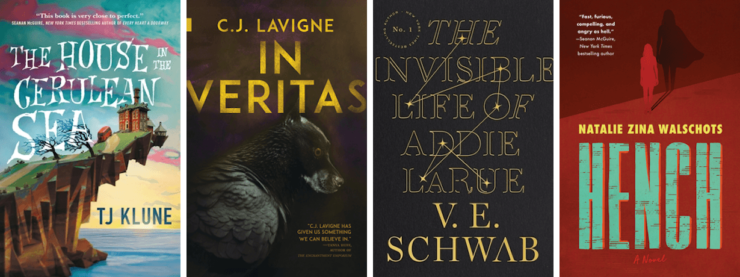
2020. What. A. Year. My reading volume has admittedly decreased over the last few months, in part because of the pandemic and politics impacting the world, and in part because I had a baby in July.
Despite this drop, however, I still managed to read some wonderful books. The House in the Cerulean Sea by T. J. Klune is one of the best and most comforting ones—it’s full of love and hope and found family, and it made me cry happy tears. This is the book I recommend to everyone, especially if they’ve been hurting and need some respite from the reality we’re living through.
In Veritas by C. J. Lavigne is another book you can sink into. It’s a tale that follows a young woman named Verity, whose synesthesia takes on some fantastical elements that make her not quite fit in the mundane world or the magical underbelly she finds in her hometown of Ottawa. If you loved The Invisible Life of Addie LaRue by V. E. Schwab (another top read of mine this year), chances are you’ll love In Veritas as well.
For those looking something a bit faster-paced than In Veritas, I would recommend Hench by Natalie Zina Walschots, who takes the superhero trope and mashes it with one of my favorite things—spreadsheet analysis (I’m not joking!). This is a fun and insightful read for everyone, especially recovering data analysts like me.
–Vanessa Armstrong
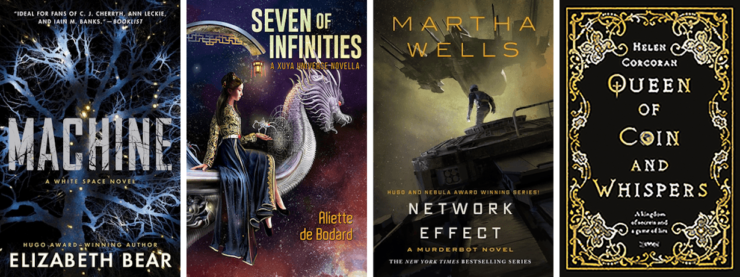
Do I even remember all that I read this year? 2020 sometimes seems to have lasted more than a decade, and at other times to have been shorter than a month, so I’m sure there’s a lot I don’t remember. But four books did imprint themselves on my memory—
Elizabeth Bear’s Machine is big-idea space opera on a grand scale. The second of Bear’s standalone White Space novels, it sets itself in and around a giant hospital in space. Its protagonist, Dr. Brookllyn Jens, jumps out of spaceships for a living—some extreme emergency responder shit there. When Jens and her team respond to a long-lost colony ship, her problems include an AI who requires medical attention, cryogenically frozen passengers who may or may not be able to be unfrozen and treated—and who’ll be several centuries out of their time if they are—and a mysterious problem that has struck down the crew and AI of the first contemporary ship to encounter the lost colony vessel. And back at the hospital, sabotage reveals underlying problems—moral, ethical problems. With compelling characters, a vast canvas, and a whole lot of really cool shit, Machine is very satisfying as a novel about professionals dealing competently and compassionately with events that spiral out of control.
Seven of Infinities by Aliette de Bodard is a new novella in de Bodard’s Xuya continuity. Drawing inspiration from Arsene Lupin and Raffles, it sees a poor scholar and a gentleperson thief—a mindship who’s been growing bored in retirement—faced with a mysterious death, a dangerous kind of treasure-hunt, and a growing mutual attraction. A dense, atmospheric, emotionally satisfying gem of a space opera.
Everyone loves Murderbot, but this year has had so much in it that I almost forgot than Martha Wells’ Network Effect only came out in June. (It feels longer ago, somehow.) Network Effect is the first full-length Murderbot novel, and it’s exactly as entertaining, sarcastic, and touching as you might expect. I’ve read it at least three times—probably more—and each time found more to enjoy. Wells is a writer at the height of her powers, and Network Effect is a powerful demonstration of her talents.
Last—but not least—I want to mention Helen Corcoran’s debut Queen of Coins and Whispers, a low-magic second-world fantasy that focuses on the relationship between a young queen and her (likewise young) spymistress as they struggle to solidify the queen’s rule in the face of foreign and domestic threats. A touching, satisfying story, and one I’ve returned to more than once as the year wound on.
–Liz Bourke
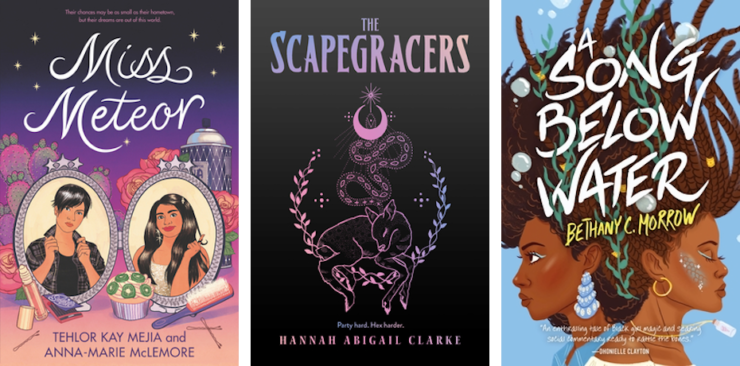
Miss Meteor by Tehlor Kay Mejia and Anna-Marie McLemore covers a lot of topics—gender identity and expression, racism, xenophobia, transphobia, queerphobia, sexism, patriarchy, class, and white supremacy—and does it all without breaking a sweat. The story is both sweetly charming and sharply astute. With a twist of magical realism, Tehlor and Anna-Marie weave a lovely story about becoming the person you want to be instead of who your oppressors demand.
Speaking of young people fighting the patriarchy, The Scapegracers by Hannah Abigail Clarke is a fierce novel by a fierce author. Think The Craft but hella queerer and with way more to say about feminism and the world. I loved every inch of this book and cannot wait for the rest of the series.
Lastly, Legendborn by Tracy Deonn and A Song Below Water by Bethany C. Morrow. Both feature young Black women discovering their magical powers and pushing back against white supremacy. These two stories left me feeling as exposed and overwrought as a livewire. The perfect novels for this year.
Extra special shout outs to some great non-YA fantasy books I also adored: Queens of Noise by Leigh Harlan, and Race to the Sun by Rebecca Roanhorse. And for short fiction, my heart is full of “Lusca” by Soleil Knowles, “Your Rover Is Here” by LP Kindred, “In the Land of the Spill” by Aliette de Bodard, and “The Bone-Stag Walks” by KT Bryski.
–Alex Brown
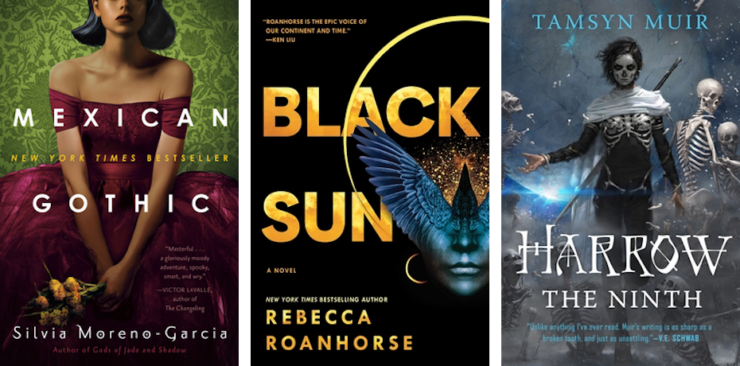
Before we begin, I’m going to cheat, and point to my previous three picks for mid-2020 (The Vanished Birds by Simon Jimenez, Riot Baby by Tochi Onyebuchi, and The Glass Hotel by Emily St. John Mandel) and hold fast to the notion that they belong on this list alongside these other unforgettable titles below. Special shout out to The City We Became by N. K. Jemisin and The Empress of Salt and Fortune by Nghi Vo, which deserve to be on this list as well, but I’m seriously running out of room, and will get yelled at, so I’ll stop while I’m ahead!
In the midst of the molasses-slow election that would turn out to take almost a week, Silvia Moreno-Garcia’s marvelous, thrilling, and entrancing Mexican Gothic kept me going. Noémi Taoboda’s gothic tale of survival, mysteries uncovered, and horror confronted at the terrifying estate of High Place was immaculately done, and had me devouring hundreds of pages in a night. And to finish it on the morning the results were announced gave me the very 2020 feeling, that as in Mexican Gothic, monsters can indeed be beaten when they are brought to the light of day.
Speaking of engaging books, I finished Rebecca Roanhorse’s Black Sun in less than a day. From a prologue that slammed into my chest and hooked itself into my heart, I could only give into the compulsion of this incredible book. Roanhorse builds an intricate and complex epic fantasy world inspired by pre-Columbian civilizations which delighted me to no end, and combining that depth of world with multiple complicated characters each on a collision course with each other? Reader, I had to stay up. I had to know what would happen next. And now, I wait eagerly for the next book in the series; I can’t promise I’ll read slower, but I will read with the same level of enthusiasm.
What to say about Tamsyn Muir’s Harrow the Ninth that hasn’t been said already? Half of the fun of reading this for the first time is then experiencing other people reading it for the first time. It is unlike anything I’ve read before, and for a book about necromancers, continues to be a breath of fresh air. Harrowhark Nonagesimus, a new saint of her undead God, is utterly broken in ways that even she doesn’t understand. This journey into the heart and mind of someone we only knew from the outside in Gideon the Ninth becomes the compass rose of this book; even at its most confusing/topsy-turvy/absolutely batshit cool heights, Harrow the Ninth works because Muir peels back, layer by bony layer, the walls Harrow built for herself, and reveals her truth to us, in memes, prose, and pure damn style.
–Martin Cahill
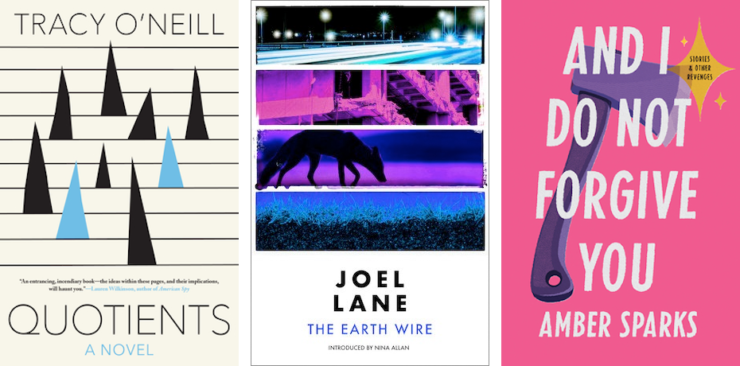
As an American reading in the year 2020, it’s nearly impossible to read fiction this year without doing so through a political lens. That doesn’t just apply to overtly political fiction, either; a novel like Tracy O’Neill’s Quotients, which concerns itself with online surveillance and social networks, serves as a reminder that technology is rarely apolitical just as much as countless think-pieces on social media and politics do. It doesn’t hurt that Quotients is also a gripping read, following its central characters across several years in a narrative that encompasses extremism, espionage, and the personas we present to the world.
In both Joel Lane’s The Earth Wire (recently reissued by Influx Press) and Amber Sparks’ And I Do Not Forgive You: Stories and Other Revenges, it’s not hard to pick up their respective authors’ profound frustration with, respectively, the Thatcher-era UK and the Trump-era US. Stylistically, the two are far removed from one another: Lane’s stories involve furtive sex, liminal lives, and hallucinatory visitations; Sparks, meanwhile, has a penchant for blending Very Online archetypes with the folklore and mythologies of bygone times. While their techniques are different, the approach is ultimately closer than you might expect: this is deeply compelling fiction as an act of protest.
–Tobias Carroll
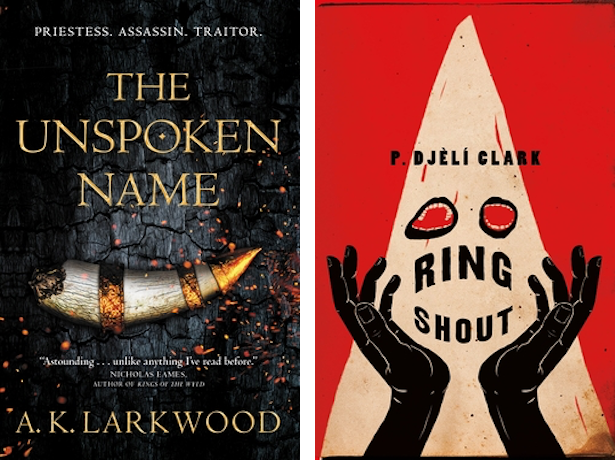
This year was So Much and All The Time, and it felt like one endless Thursday, but here we are, at the end of the year, and all I want is to run away into the mountains. My picks: The Unspoken Name which allowed me to escape this very intense timeline, and Ring Shout, which challenged me to confront it.
The Unspoken Name, by A.K. Larkwood, is an epic fantasy that follows Csorwe, a lesbian orc assassin turned regent’s guard dog. Sent on a goose chase for a thingamaguffin with her rival/best friend Tal, she runs into the most beautiful, stunning, amazing girl and falls head over heels in like two days. Full of strange, sacrificial magic, Unspoken Name is a masterfully crafted world that is part portal fantasy and part heist. It’s big and mythic, with a deeply intense romance and a sense of history. I’ve written about this book multiple times at this point, and I’m not going to stop screaming about it. I devoured this book early this year and haven’t stopped dreaming about it. It remains a great, hugely escapist read, and I’m so ready for the second book.
I’ll admit I didn’t read a lot of the books I wanted to. Luckily, there’s a ton of short novellas out there! Ring Shout is an uncompromising story about women fighting against the dual threats of both the hatred-mutated monsters of the Ku Klux and the white supremacist human Klansmen. It merges magic and historical fiction, creating a firestorm of feeling, mixing past and present in a weirdly prescient narrative. Confronting racism in fiction is powerful, and it allows us to look outward, in our own lives and the world, and see the parallels. Maryse is a powerful narrator, a woman recovering from trauma, with a real weapon, pulled out of time, that sings to her through ancestors and blood. Ring Shout is a reflection of our current time and our past, and historian/oracle P. Djèlí Clark has delivered a book that gives us hope for the future, by reminding us that we need to fight for it.
–Linda H. Codega
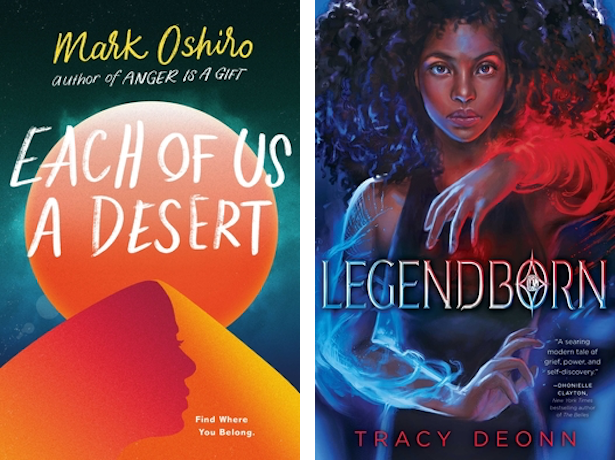
QTPOC speculative fiction is always a beacon. But this year, it means more than ever, envisioning worlds that sing with revolution, love, and joy.
Each of Us a Desert by Mark Oshiro is a triumphant ache, an ambitious odyssey. It’s an unmaking and reshaping of faith, a paean to self-discovery and the healing propulsion of queer love. This book sunk into my marrow.
If you, like me, grew up loving intricate adventures with prophecy, magic, and morally grey characters, but can’t stand the misogyny, cisheteronormativity, and persistent whiteness of most popular series in that genre—Rebecca Roanhorse’s Black Sun is for you. And if you’ve never been able to invest in those series for exactly that reason, Black Sun is also for you. This queer, trans, pre-Columbian-inspired epic fantasy is vibrant, vicious, and thoroughly satisfying.
I recommend Tracy Deonn’s Legendborn every day. It’s all the fun of contemporary Arthurian legend while centering Southern Black Girl Magic and being a very deliberate indictment of the white supremacist structures of our nation, our institutions, and our Western literary canon. It’s also a deeply cathartic exploration of grief. I am so excited for Bree’s further adventures, and so deeply grateful for this book!
–Maya Gittelman
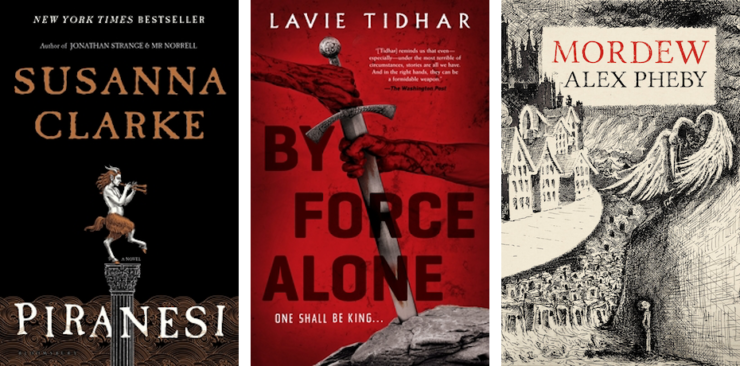
Susanna Clarke’s Piranesi is a book about discovery, and as such hard to review. Saying even a little about it may be saying too much. Suffice it to say that it was one of the most enjoyable reading experiences I had this year. Many readers have called it a timely book, and it is, but it would be among the year’s best whatever year it appeared.
Alex Pheby’s fantastic Gothic novel Mordew hasn’t appeared in the U.S. yet, though it’s on the way. It’s vast, mysterious, unpredictable, and moving. Pheby also does something I’ve never seen before with his book’s hundred-page glossary, which clarifies many mysteries from the main text and drops hints about the coming sequels. Reading the Glossary after reading the novel gave me the feeling that I’d just read two overlapping, interlocking, and very good books. (Full disclosure: I’m friendly with Mordew’s British publishers.)
Finally, Lavie Tidhar’s revisionist Arthurian fantasy By Force Alone was a great mix of high learning and low behavior. To my mind, the best Arthur novel since Thomas Berger’s Arthur Rex back in 1978.
–Matt Keeley
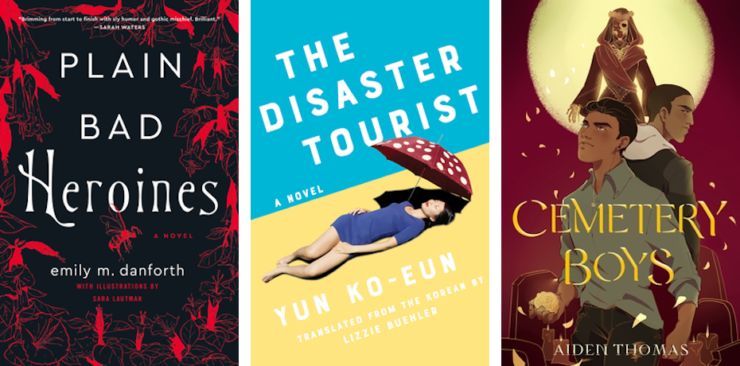
First off, I’ve just got to admit (as do we all) that the pile of awesome-looking 2020 books on my table is big. I’m sure there are some more contenders in there! But regardless, the second half of the year brought me several absolute knock-outs: books I adored, books that got me thinking and gnawing over their prose and laughing and crying.
Plain Bad Heroines is the (much-anticipated) second novel from Emily M. Danforth and, as you might guess from my review, seals the deal as one of my favorite books of the whole cursed year. It’s got tons of queer women, it’s metafictional, it’s spooky, and the prose is gorgeously incisive. I also was a big fan of The Disaster Tourist by Yun Ko-eun (trans. Lizzie Buehler), a novel recently translated to English, for its grim and perceptive exploration of neoliberal global economics, gender, and dark tourism.
Then to totally switch gears, we’ve got Harrow the Ninth by Tamsyn Muir. This novel is as balls to the wall as Gideon the Ninth, maybe even more so, and it’s decadently confident in its complicated, clever machinations. Also… very funny. Lastly, a book I didn’t get to review but deserves a shout-out: Cemetery Boys by Aiden Thomas, starring a memorable and engaging trans queer Latinx protagonist, ghost summoning, and some excellently deployed supernatural plotting.
–Lee Mandelo
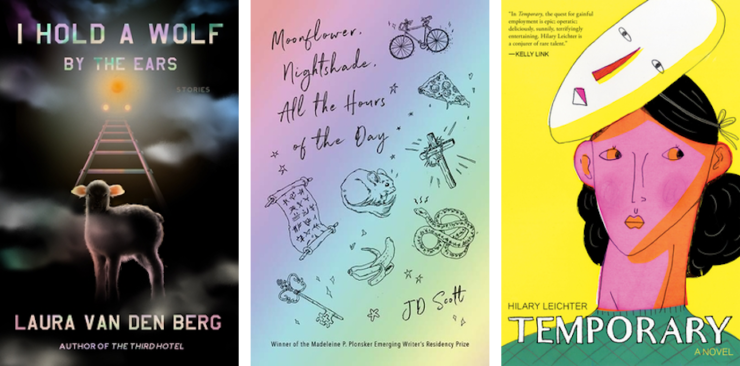
There was something about 2020—I can’t imagine what—that made fragmented reading experiences the most satisfying to me. I’m looking back at my reading from this year and seeing that the books that really stood out were either short story collections, non-fiction I could read in short bites, or, in one case, a picaresque. Laura van den Berg’s collection I Hold a Wolf by the Ears is dark, unsettling, and literally haunted, with ghosts turning up in almost every story. It’s also one of the best evocations of Florida that I’ve ever read, and hat state is hard to evoke.
In retrospect, Amber Sparks’ And I Do Not Forgive You feels a bit brighter—Sparks’ stories are animated by anger than the grief that marks van den Bergs work—and the standout story, “Lizards”, is a lacerating SF take on misogyny and the Kavanaugh hearings.
Finally, JD Scott’s luminous collection Moonflower, Nightshade, and the Hours of the Day takes fantasy elements and throws them into relief in the modern world: angels narrate a story about the AIDs pandemic; a modern-day Christ trains for crucifixion like a Crossfit bro; a young man goes on a mythical quest in a mall that, in Scott’s future, envelops the entire planet. There’s also a chinchilla that might be immortal, who kind of nurses a coke habit? There’s a lot going on.
And if I had to pick an all-time favorite red of the year I think it’s Hilary Leichter jewel of a book, Temporary. In my initial review I called it the Great Late Capitalist Novel—but don’t worry, this is not a slogging, hand-wringing book that wants to harangue us about The Way We Live Now. Temporary is fun, weird, and hilarious. An unnamed temp worker takes on a series of surreal jobs, (including Assassin Assistant, Pirate, and Ghost-in-a-Haunted-House) as she searches for the most elusive prize: Permanence. I love it when an author proves that comic novel can also be packed with heart and meaning!
–Leah Schnelbach
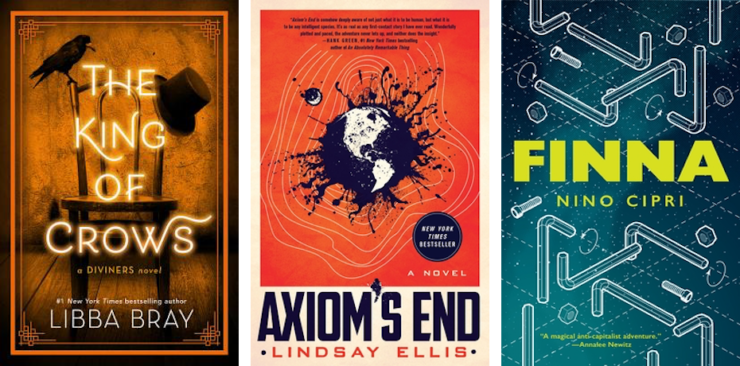
Oh, February 2020. You were such a different time. It’s hard to believe that my time at Tor dot com started just those months ago, and I was honored to review the final book in one of my favorite series. Libba Bray’s The King of Crows had been in my top three most anticipated titles of the year, and I cannot express how much it delivered. Her Diviners series continues to age like the finest of wine, becoming stronger with each year and each re-read, and every page resonates deep in the soul.
And, of course, I can’t ignore some of the fantastic reads that followed: Lindsay Ellis’ Axiom’s End analyzed the cost and morality of truth (while throwing in some killer Transformers aesthetic), and I read Sabaa Tahir’s An Ember in the Ashes series for the first time. I’ve begged everyone I possibly can to please read A Song Below Water by Bethany C. Morrow, one of my absolute favorite debuts of the year, and I’m pretty sure everyone is getting a copy of FINNA by Nino Cipri from me this holiday season. I still find myself quoting the cats from Siobahn Carroll’s novellette “For He Can Creep” with flash and fire in my voice!
I can’t wait to dive into the next year with Tor, read more queer, speculative, joyful, and haunting works. 2020 may have been a trashfire, but it was absolutely a great year for stories.
–Cassie Schulz
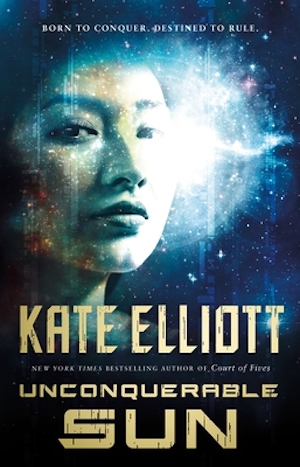
Two trends dominated my thoughts and my reading in 2020—escapism, and the reaching or depiction of a world that is better than our own in significant ways. The very best book of 2020 for me combines the virtues of both, written by one of my heart authors.
That book is Kate Elliott’s The Unconquerable Sun.
The high concept “Genderflipped Alexander the Great in Space” tells you all you need to know about the book, and only scratches the surface of what the book is doing. Depicting a future beyond the horizon of what could be, the diverse, intensely interesting, wide open space opera universe. It’s been a long while since this Queen of Fantasy has played in a SF verse in this way, and it is a welcome return in this moment of 2020 to come across a world where a lot of the baggage of our world in terms of gender, sexuality and a lot of patriarchial hangups simply don’t exist in Elliott’s world. And yet even so, there is plenty of our own world she comments on, via the transmorgification into SFnal equivalents in her future world.
But as is her wont, especially in her doorstopper length works like this, this is a novel full of operatically intense characters, titantically interesting worldbuilding and action and dramatic beats that keep the reader turning pages. I kept looking for the references, allusions, and tie ins to Alexander’s real history, and the many other things that Elliott has embedded from our own world into hers, as well as seeing how she has taken a classic historical story and setup, and turned it to her own advantage in a space opera future world.
I fell immediately into the orbit of Princess Sun, and this review casts nothing more than a reflection of her glory.
–Paul Weimer
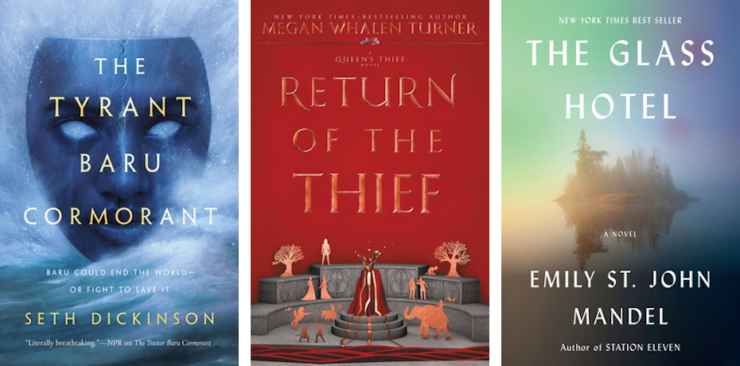
This year’s favorites are the books I went into 2020 expecting to love, but the ways in which they resonated in this unprecedented year was something I never could have predicted. Bleak middle books of favorite series conjured a strange hope, while an unambiguously happy ending made me question everything. Plague, or the deliberate absence of it, somehow calmed me because I got to witness how it played out at a distance in fictional worlds. And never would I have thought that Harrowhark Nonagesimus and Baru Cormorant would be the people with whom I would want to weather a life-altering pandemic, but misery loves company, and they proved the perfect literary companions.
The best books for me this year were the dense ones, whose familiar worlds I could sink back into, even if I had to work to reorient myself. Seeing Baru’s plot against the Masquerade extended from three books into four meant more time with The Tyrant Baru Cormorant, with her breathtaking budgeting of others’ lives and her gnawing self-doubt about her place within the cancerous empire. Seth Dickinson’s geopolitical fantasy series makes me feel like I’ve been let in on a wondrous secret, and makes me finally understand why my parents have been turning to binge-watching so many political dramas since lockdown started. I don’t think I could have handled Baru’s story ending this year, so I’m grateful for more time to watch her struggle to balance her personal ledger. Conversely, I got to make my peace with Megan Whalen Turner’s The Queen’s Thief series ending after almost a quarter-century. Like each book before it, comfort reads that simultaneously challenged readers to take nothing at face value, Return of The Thief doled out treasured passages and textual queerness to loyal fans while still sneaking in a final trick or two. Turner’s books have always invited questioning, and the ability to interrogate the mechanics of a peaceful series finale in this particular year was a rare gift.
Yet the biggest literary surprise of 2020 for me was Emily St. John Mandel’s The Glass Hotel. All of the buzzy lead-up contrasted it with the odd prescience of Station Eleven and its Georgia Flu, assuring readers that this was no dire prediction. But what no one prepared me for was that The Glass Hotel is an honest-to-goodness AU of Station Eleven, a parallel universe in which the Georgia Flu is contained before it can ravage and remake society. People who died alone in one book live long and fulfilling lives in another; those who do come to ruin at least bring it upon themselves. Also inhabiting that sweet AU sphere is Tamsyn Muir’s Harrow the Ninth, in which poor Harrowhark the First despairingly tries to conjure a world that doesn’t map to her current reality. While her attempts don’t hold up under scrutiny the way that The Glass Hotel’s mirror universe does, the fact that both books grapple with terrible futures and consider alternate paths gives me hope that we’ll come out of 2020 not just buckling under hindsight, but with at least a sliver of our foresight possibly restored.
—Natalie Zutter










